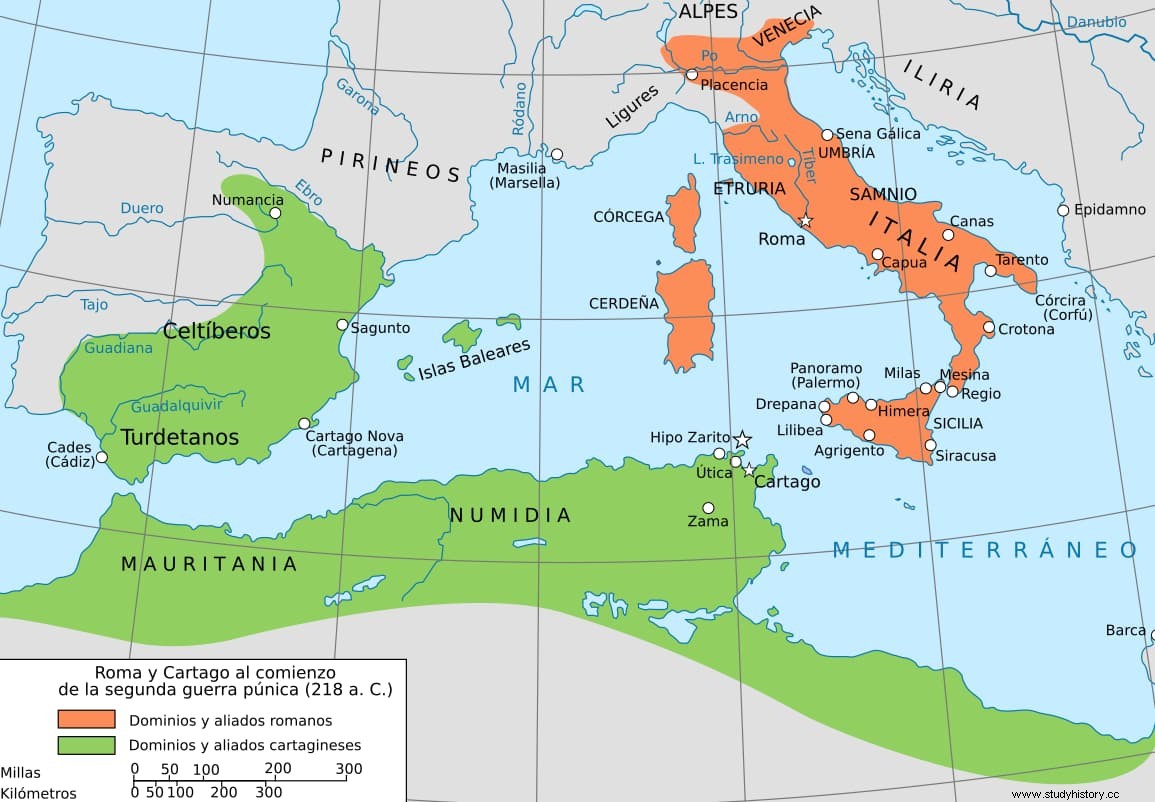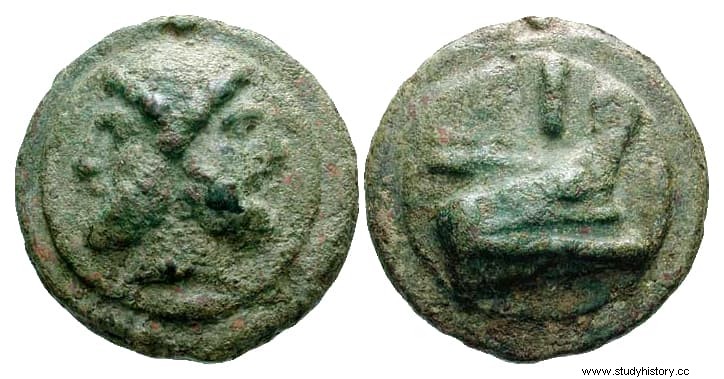If someone believes that corruption is an exclusive phenomenon of our days, they are completely wrong; There have always been swindlers, profiteers and opportunists, and in history there are a few who are amply accredited, since the beginning of time. And, of course, ancient Rome was not going to be an exception. Of the several examples that could be cited, we are going to take a brief look at a couple of them who staged a fraud in the late 3rd century BC. based on false shipwrecks to collect the insurance:Marco Postumio Pirgense and Tito Pomponio Veyentano.
Not being heroic or really transcendent characters, we know very little about them and limited to the illicit activities they carried out, being Tito Livio the only documentary source to know them. Everything happened in a context as propitious as warfare always is:the Second Punic War.
This contest once again pitted the Romans and Carthaginians for control of the western Mediterranean after a previous one that had taken place between 264 and 241 BC. and that ended with the victory of the first, who achieved their objective of snatching Sicily from their enemies (except Syracuse) and, taking advantage of an internal conflict that they later suffered with the mercenaries they had hired, also plundering Corsica and Sardinia.

Twenty-three years later that rivalry erupted again when the Punic clan of the Barca, headed by Amílcar and his son-in-law Asdrúbal, found in the exploitation of the riches of Hispania the solution to the battered state in which the economy of their republic had been left. . After them, the son of the first, Hannibal, took over and was expanding the Carthaginian domains at the expense of other Iberian cities. As some were under the Roman orbit, a new clash between the two powers was inevitable and Hannibal decided to go ahead, taking the initiative to personally lead his famous expedition to Italy, where he crushed his opponents in the famous battles of Trebia, Trasimeno and Cannae.
With them, the alliance of a multitude of Italic peoples was attracted, in addition to that of Macedonia. Quintus Fabius Maximus had been delaying Carthaginian progress with cunning delaying tactics that, however, the Romans did not like, so he ended up being displaced. This is how things stood for the Romans, with danger at the gates of their capital, some populations joining the invader and the legions half-destroyed, when everything got worse when the news arrived that the prefect Titus Pomponius Veientano had not only been defeated by Hanno, Hannibal's lieutenant, but had fallen prisoner, with the consequent bad press that this entailed. Tito Livio describes him in unfavorable terms:

The situation was approaching the limit and all of Rome trembled before the arrival of Hannibal, unleashing a certain hysteria among the people. The peasants abandoned their fields and ran to take refuge behind the walls, the people stopped practicing religious worship and, instead, unusual traditions were practiced, exclusive to moments of exception, such as the Ver sacrum o Sacred Spring, in which everything born during that season was immolated (including children, according to some authors, although others believe that only animals and humans were sent on a pilgrimage upon coming of age), or the Mundus (ancient Etruscan temple where a ritual was held that watered the earth with the blood of the victims).
The chaos also affected politics. In order not to divert the consuls from their military duties, Cayo Claudio Centón was elected dictator, although later Quintus Fulvio Flaco and Celery Claudio Pulcro were chosen for the consulate, after which Centón left his position. It should be said, as a curiosity, that one of the elected curule aediles was a character who would later prove decisive:Publius Cornelius Scipio, before earning the agnomen of Africanus and who was opposed by the tribunes of the plebs because he was not yet of legal age ("If all the citizens want to elect me mayor, I'm old enough" was his reply).
The new consuls received two legions each to face the Carthaginians but it was not enough and they had to recruit others on their own, adding in the end a total of twenty-three. It was not easy at all because the defeats, the abandonment of the fields and the obstacles suffered by trade had resulted in a pressing shortage of resources. Quintus Fulvius Flaccus then summoned a contio or assembly, in which he informed that the equipment of all those forces would be put up for public auction. The beneficiaries, yes, would have to commit to waiting to collect until finances permitted. In exchange, they would be compensated by exempting them from joining the ranks; Likewise, they were guaranteed the payment of the insurance provided for the transport of these supplies.
Insurance became the main fraud. Actually it was not something new, since Titus Pomponius Veientano had already practiced it in the past, before being captured by Hanno, but now Marco Postumus Pirgense, a publican (tax collector) who Titus Livy says that “hindered the recruitment of the consuls and came close to causing serious disturbances” and "whose trickery and greed for many years no citizen had equaled, if we save Titus Pomponius Veientano." What was his gossip about? Livio himself explains it clearly:
That is to say, they chartered ships that were in poor condition, they kept small loads of things of little use in their holds, they falsified the delivery notes stating that the ships were full and finally they deliberately sank them on the high seas as if they had been shipwrecked by a storm. Next, they presented the corresponding claim report to the State, which was the one that had to pay for the insurance policy agreed in the award contract. Sometimes they didn't even bother to use real ships, just record their loss.
The trick was so obvious that there were no lack of complaints. The praetor Marcus Aemilius Lepidus, for example, did so in 213 B.C. before the Senate; but uselessly because he did not want to inconvenience the publicans and risk hindering the military supply in those serious circumstances. However, there was a suspicion that the senators took a percentage for looking the other way and the scandal grew like a rolling snowball until it put the very security of Rome at risk:in the face of that abuse, people began to be reluctant to a recruitment from which the corrupt were freed.

The following year, two tribunes of the plebs, Spurius Carvilius and Lucius Carvilius -perhaps brothers-, proposed prosecuting Marco Postumius and fining him two hundred thousand ases (of Etruscan origin, the bronze as was the preponderant currency in Rome until the reform of Rome). August). A date was set for it, but Postumius did not sit idly by; he kept, like an ace up his sleeve, the support of another tribune named Gaius Servilius Casca, a relative of his, whose veto would suffice to put an end to the vote. Or so he thought because when the day of the debate arrived, with a massive turnout of the mob on Capitol Hill, things went differently. Let us turn again to Tito Livio:
That is to say, there was a polarization of positions that were also totally opposed:that of the wealthy classes, in which the publicans began to constitute the new equestrian estate, and that of the plebs. And that social clash, prolongation of the ancestral one between patricians and plebeians, was not only verbal but also physical; in fact, there was an outbreak of a fight that forced the consul Fulvio to intervene personally. Addressing the tribunes, he urged them to dissolve the assembly lest it lead to an insurrection. They listened to him and the Senate was summoned, who were informed that the publicans had burst the assembly with their audacity and violence.
Postumius' stubborn attitude was compared to that of Marcus Furius Camillus and other characters in Roman history, who had agreed to be condemned and exiled rather than bring about the ruin of Rome. Indeed, they were very different attitudes. This is how Livio explains it:
The Senate concluded that it was an act of violence against the State that could set a dangerous precedent, so the two tribunes withdrew the fine proposal to ask for a greater penalty:if he did not satisfy the required amount he should be imprisoned. Postumius relented and posted bail but did not appear; the tribunes demanded that he appear before the Kalends of May or he would be sentenced to exile and his property seized, a motion approved by the plebs. He finally chose to go into exile with some faithful while the action of justice was extended to his supporters:
